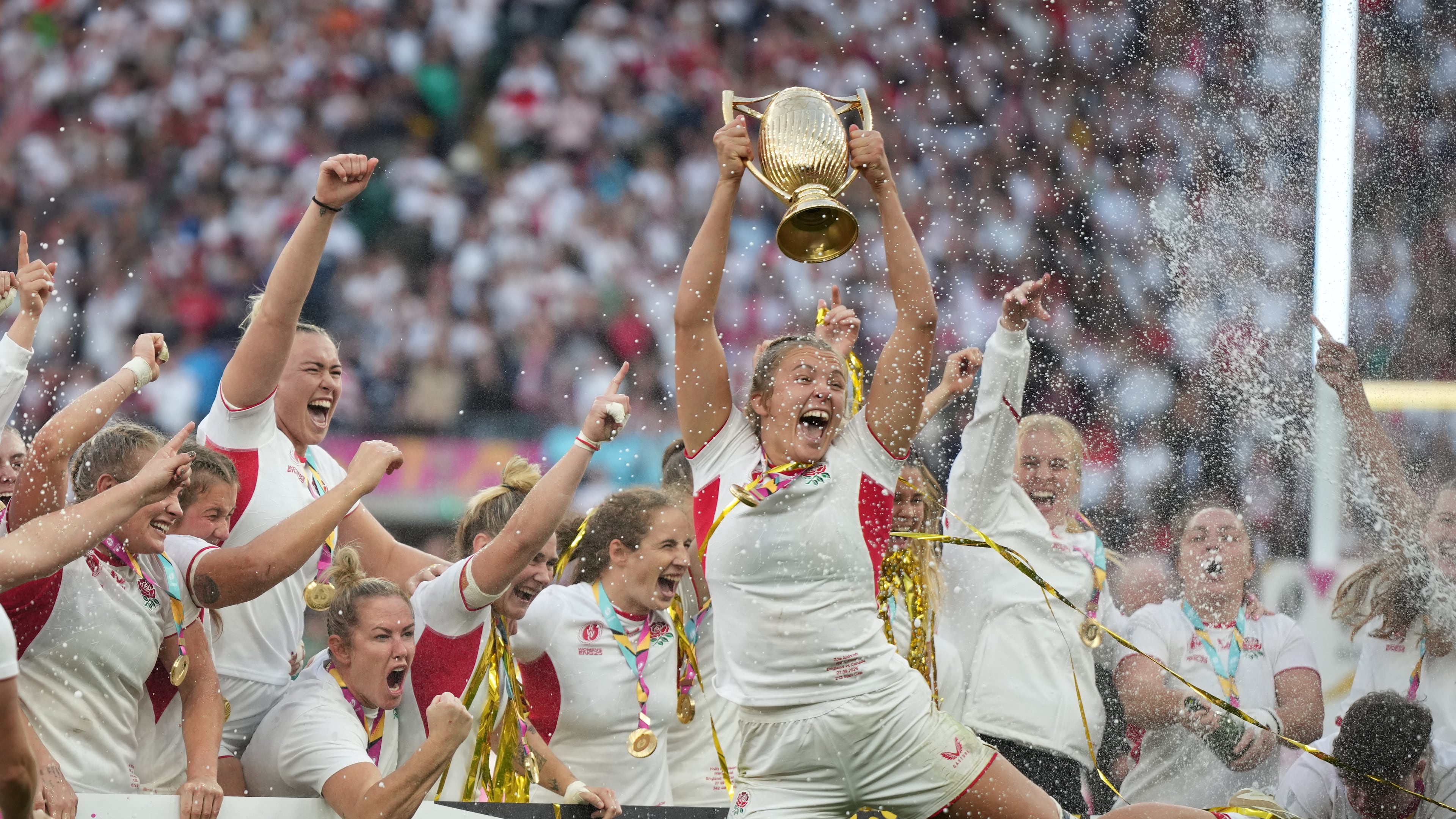Untouchable England outclasses Canada to win Women's Rugby World Cup in front of record crowd

LONDON (AP) — England finally has a Women's Rugby World Cup title to confirm its utter world domination after outclassing Canada 33-13 in front of a record crowd at Twickenham on Saturday.
The clearcut victory by five tries to two capped an astonishing World Cup cycle in which England won every match, 33 in a row, the greatest streak in international rugby.
The prospect of a home tournament topped by a home champion sold out Twickenham five weeks ago, and 81,885 spectators, the largest crowd in women's rugby history, were treated to a showcase of England's unstoppable power.
England was appearing in a seventh straight World Cup final but had won only one of the previous six, in 2014. The other title was in 1994.
Losing the 2022 final to New Zealand, the last time England tasted defeat, was a bitter blow for the most resourced, most deepest and strongest women's team in world rugby. It drove the Red Roses to get the formula right when the World Cup came home for the first time in 15 years.
“The past certainly dictates the now and the girls hung tough in the whole tournament and connected with the nation,” England coach John Mitchell said.
“I thought we were superb defensively in the tournament; our attack didn't need to be at its best but it was effective enough to get the job done. Canada are a good side but they hadn't come up against us and we were waiting."
Canada bossed everyone, including defending two-time champion New Zealand in the semifinals, en route to its first final in 11 years, validating its No. 2 ranking and unbeaten campaign this year.
But the best offloading team in the tournament with the fastest ruck speed couldn’t get its natural game going, crashing into England's defense. Canada didn't have a plan B.
“We smashed it out there today and I can’t thank the girls enough for putting their bodies on the line,” England captain Zoe Aldcroft said. "There was no doubt in our minds coming into this that we were going to do the job.”
England saved its best performance of the World Cup for last, setting the tone at the first scrum, shoving Canada backward. The English would destroy Canada's scrum and mauls.
Even goalkicking lock Sophie de Goede, at the heart of Canada's impressive performances just two months into her comeback from an ACL tear, was stymied. She got to smile after the final, though, after receiving the world player of the year award ahead of England's Megan Jones and New Zealand's Jorja Miller. De Goede's teammates threw her in the air.
As it did in every game, Canada scored first through glitter-faced right wing Alex Hogan-Rochester from a two-on-one.
The lead lasted only three minutes. Out of nothing, fullback Ellie Kildunne, last year's world player of the year, broke a tackle, stepped a couple more and scorched the cover to score behind the posts.
More Canada errors were turned into points by England.
There was a lineout drive try for hooker Amy Cokayne, who scored three similar tries in the 2022 final. An intercept on halfway by Tatyana Heard was the origin of a try for No. 8 Alex Matthews, playing in her fourth straight final.
Canada had to score next but on England's try-line the ball was poached by Aldcroft. Canada admitted it was struggling by kicking a penalty while 21-5 down.
The half finished with England prop Hannah Botterman greeting her second jackal penalty with a double-fisted roar in delight.
England started the second half with a try by lock Abbie Ward. When Zoe Harrison's conversion attempt hit the post, it was her first miss in 15 goalkicks going back to the pool stage.
While Botterman was in the sin-bin, Hogan-Rochester got her second try for Canada. When another sustained period of pressure died from a knock-on in front of the England posts, Canadian Prime Minister Mark Carney put his head in his hands.
England put the finishing touches on the biggest win in a final in 27 years when a spiral bomb spun back into its hands and Matthews scored her second try.
New Zealand takes bronze
New Zealand bowed out in style after slamming six tries against France to win the bronze medal.
Rebounding from their semifinal defeat to Canada, their first loss in a knockout match in 34 years, the world champion Black Ferns won 42-26.
Winger Braxton Sorensen-McGee, the 18-year-old sensation at her first World Cup, scored her 10th and 11th tries, the second highest tally in World Cup history. Only retiring teammate Portia Woodman-Wickliffe scored more; 13 in 2017.
Renee Holmes was the player of the match for a 17-point haul, including five goalkicks from eight off the tee.
New Zealand led 39-7 after an hour then suddenly dropped off tackles and France scored three tries in 10 minutes to flanker Lea Champon and backs Gaby Vernier and Emilie Boulard.
France also scored the opening try by scrumhalf Pauline Bourdon Sansus from an inside pass by retiring co-captain Marine Menager.
But most of the next hour was New Zealand’s with often breathless play started by forwards Kaipo Olsen-Baker, Liana Mikaele-Tu'u and Chryss Viliko.
Sylvia Brunt scored one try and set up two, and sevens superstar Jorja Miller, who missed the semifinal injured, sent in lock Laura Bayfield for 26-7 at halftime.
Then Sorensen-McGee turned it on. A dummy, left-foot step, and 30-meter glide to the try-line. Moments after Woodman-Wickliffe was replaced to huge acclaim, Sorensen-McGee dived in beside the right corner flag.
"There are only three teams that get to win a medal and to be one of those teams, no matter what color it is, we’re so grateful,” Brunt said.
___
AP rugby: https://apnews.com/hub/rugby
More Stories
The Latest

